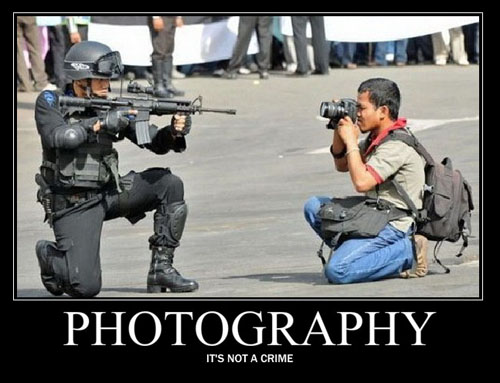Boston Police Charge Those Who Videotape Arrests as “Wire Tappers”

This week the ACLU filed a lawsuit against the Boston Police Department for using “wiretapping” laws to prevent citizens from taking video footage of police arrests. Some would naively think such laws were passed to protect the people from the authorities, not vice versa. (details in Law.com)
Following Training?
Boston police spokeswoman Elaine Driscoll rejected the notion that police are abusing the law to block citizen oversight, saying the department trains officers about the wiretap law. “If an individual is inappropriately interfering with an arrest that could cause harm to an officer or another individual, an officer’s primary responsibility is to ensure the safety of the situation,’’ she said.
Boston Globe
A near identical pattern emerged when Jon Surmacz, 34, a webmaster at Boston University, filmed BPD officers breaking up a holiday party in December 2008. Police arrested Surmacz for illegal surveillance.
Since the 1960s, Massachusetts has had laws that protect citizens from being surreptitiously recorded. In this case, the police infer this right extends to public places, and that an arrest should receive the same protections as a private discussion.
This is part of a larger trend in which citizens’ impulse to record public events is treated as criminal behavior by law enforcement officials. Blogs such as War on Photography and Photography is Not a Crime pick this theme up.
Boise, Idaho police recently seem to have sodomized a man in their custody with a Taser. The incident was recorded, and so the facts of this incident were able to be addressed. Arresting those who record the police absolutely creates a chilling effect, as such recordings may serve a broader public interest.

 The future of digital experiences will be built by strategists who grasp the full array of emerging business, social, and technical models. Specialties in user experience, branding, application design, and data science are laying the foundation for richer user experiences and business models breakthrough products and revenue based marketing.
The future of digital experiences will be built by strategists who grasp the full array of emerging business, social, and technical models. Specialties in user experience, branding, application design, and data science are laying the foundation for richer user experiences and business models breakthrough products and revenue based marketing.
4 Responses to "Boston Police Charge Those Who Videotape Arrests as “Wire Tappers”"
February 22, 2010
The MA law is outrageous, yes.
For the time being, it is unquestionably legal to *video* record any activity seen in a public setting. Audio on a recording device is much more problematic and should be disabled by anyone seeking to record public protests, police misbehavior, etc.
Let’s tell our lawmakers to amend this bad legislation. It does the police and the public no good to limit the oversight of these civil servants as they “serve and protect.” I applaud the ACLU and others who sue police departments and officers that knowingly obstruct even the limited audio/video rights we currently have.
Thanks, Dave. It’s a good topic that should be discussed more often.
February 23, 2010
James- why is audio more problematic?
February 23, 2010
[…] photography of police be illegal? http://usefularts.us/2010/02/22/bost…rrest-wiretap/ This week the ACLU filed a lawsuit against the Boston Police Department for using […]
May 21, 2010
Thanks for sharing the post.